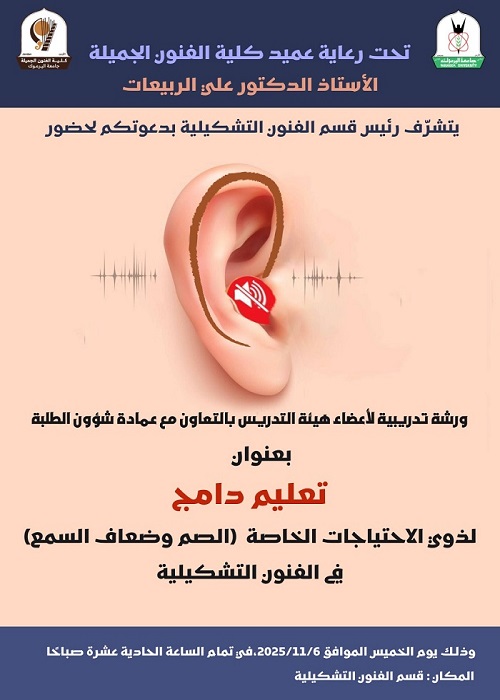The Department of Fine Arts Holds a Training Workshop on Working with Students with Special Needs (Deaf and Hard of Hearing).
As part of the Faculty of Fine Arts at Yarmouk University's efforts to foster an inclusive and supportive academic environment for all students, the Department of Fine Arts held a specialized training workshop for its faculty members entitled "Working with Students with Special Needs (Deaf and Hard of Hearing)." The workshop was held under the patronage of the Dean of the Faculty, Professor Ali Al-Rabiat, and in cooperation with the Deanship of Student Affairs.
At the beginning of the workshop, the Head of the Department, Dr. Mohammed Salem, welcomed the lecturers from the Deanship of Student Affairs, expressing his appreciation for their cooperation in presenting this valuable workshop. He also expressed his gratitude for the active participation of the faculty members, emphasizing the importance of such initiatives in developing inclusive teaching methods and raising awareness among the academic staff about the needs of students with disabilities.
The workshop was attended by the Dean of the Faculty, Professor Ali Al-Rabiat, who commended the efforts made in organizing this unique initiative, affirming the Faculty's commitment to adopting educational practices that contribute to the inclusion of all students within a fair and stimulating academic environment conducive to creativity. The workshop was presented by Professor Muawiya Al-Bazour, Professor Luay Khasawneh, and Professor Omar Al-Shalabi from the Deanship of Student Affairs – Center for Supporting Students with Disabilities. They addressed several topics focusing on defining the deaf and hard-of-hearing student population, the challenges they face in the university environment, and appropriate educational methods for interacting with them in classrooms, particularly in visual arts disciplines that require direct visual communication and interaction.
Professor Muawiya Al-Bazour opened the workshop by discussing the importance of understanding the linguistic, cultural, and social characteristics of deaf and hard-of-hearing students. He emphasized that the success of the educational process for this group depends on the teacher's awareness of the nature of visual communication and the students' linguistic and psychological needs. His presentation addressed the most prominent challenges facing deaf students in the university environment, including auditory comprehension difficulties, the need for a visually accessible classroom environment, and the adoption of teaching methods based on practical demonstration and direct visual participation.
Al-Bazour explained that effective education for students with hearing impairments requires faculty members to adopt flexible teaching strategies that include visual repetition, the use of body language, demonstrations, and the use of visual and assistive technologies. He also called for establishing a culture of inclusive education by creating an academic and psychological environment that makes deaf students feel fully included in the university community. He emphasized that this approach aligns with the university's vision of empowering all students and promoting their equal participation in academic and cultural life.
During his intervention, Professor Luay Khasawneh clarified that faculty members must interact with students with disabilities in accordance with university regulations, ensuring fairness and equality in the application of rules to all. He noted the possibility of granting specific accommodations to deaf and hard-of-hearing students that address their academic needs, such as extra time during exams or the use of assistive devices to clarify information. He also pointed out that the university, through the Center for Supporting Students with Disabilities within the Deanship of Student Affairs, provides comprehensive services, including sign language interpreters and the adaptation of academic and service facilities to meet students' needs, thus reinforcing the principle of inclusive education and a supportive university environment.
The workshop concluded with an extensive dialogue between the lecturers and faculty members, during which a number of inquiries and suggestions were raised regarding ways to develop inclusive education methods at the college.
At the end of the meeting, Dr. Mohammed Salem expressed his gratitude to the lecturers for their valuable expertise, emphasizing that the College of Fine Arts is committed to its efforts to establish a culture of inclusive education and adapt curricula and teaching methods to meet the needs of all students and promote the principle of equal opportunities in the educational process.








